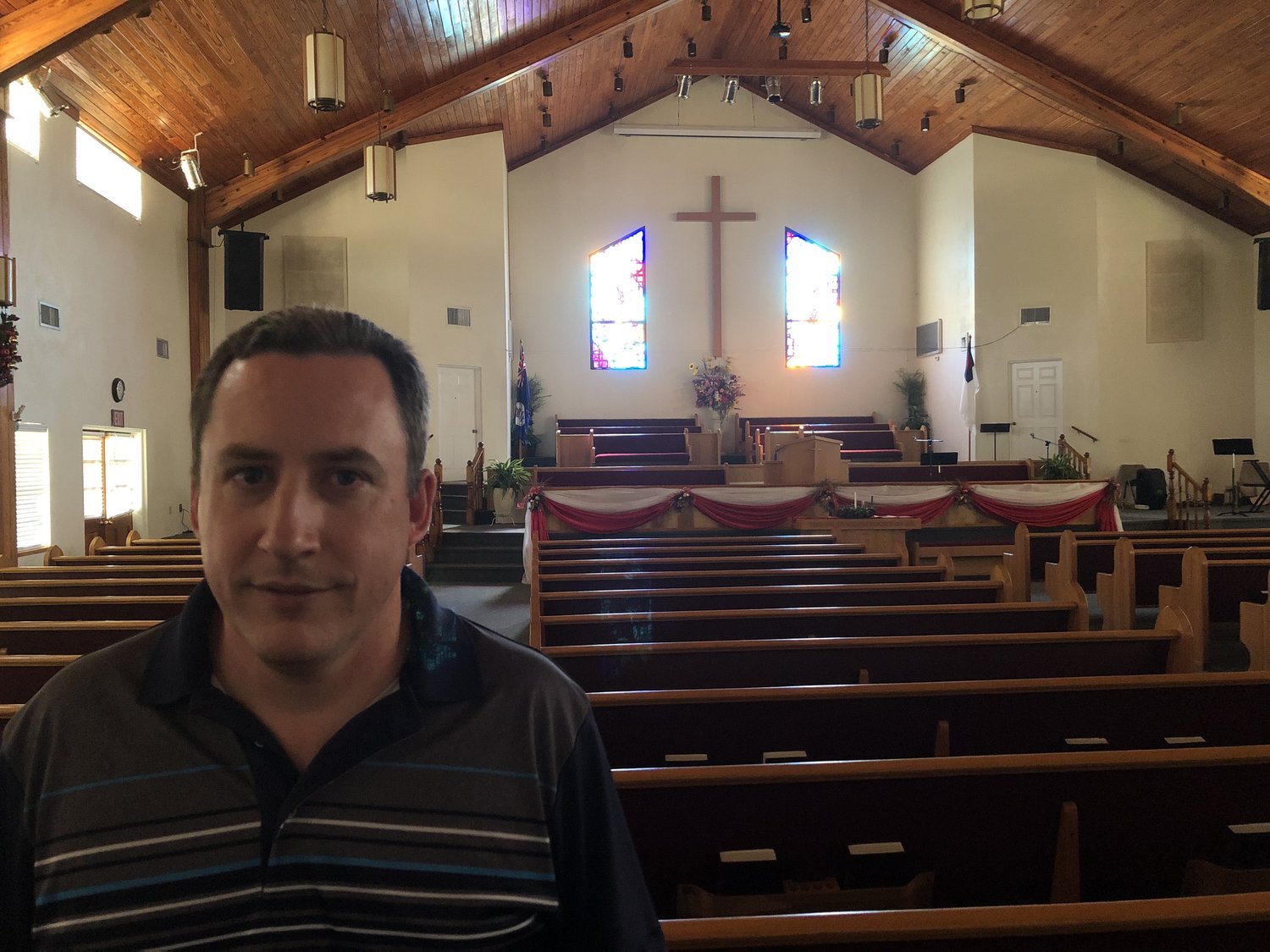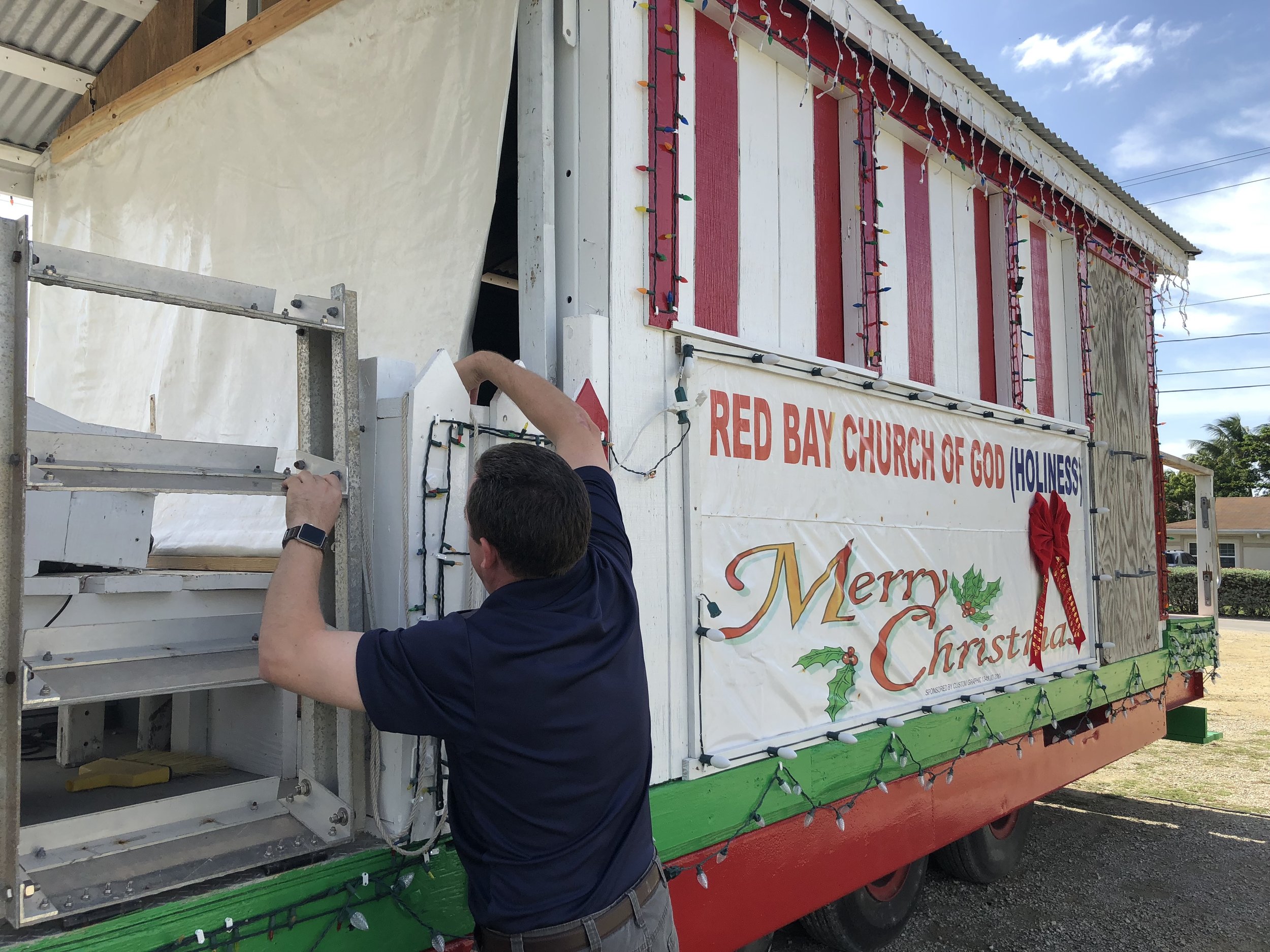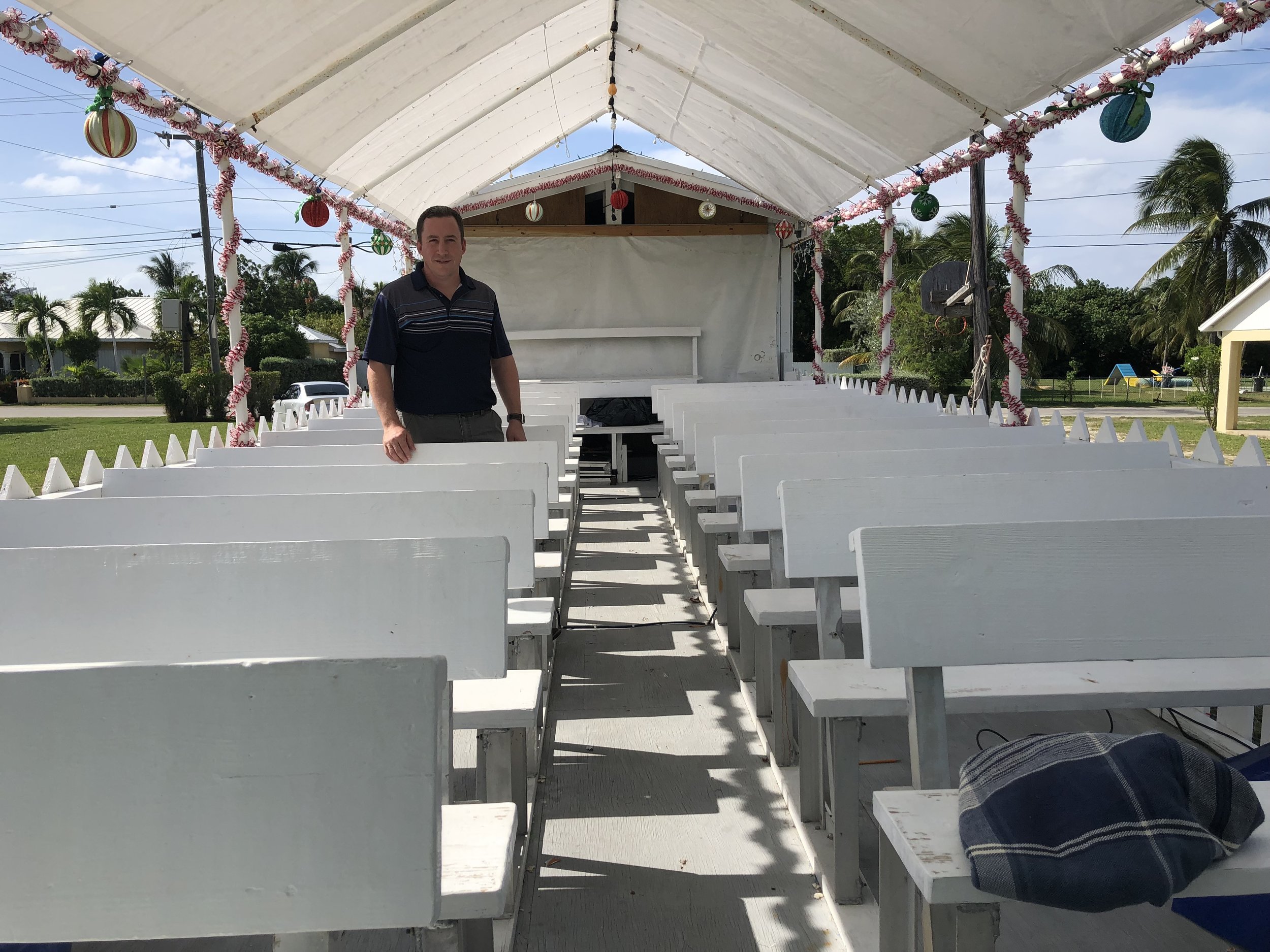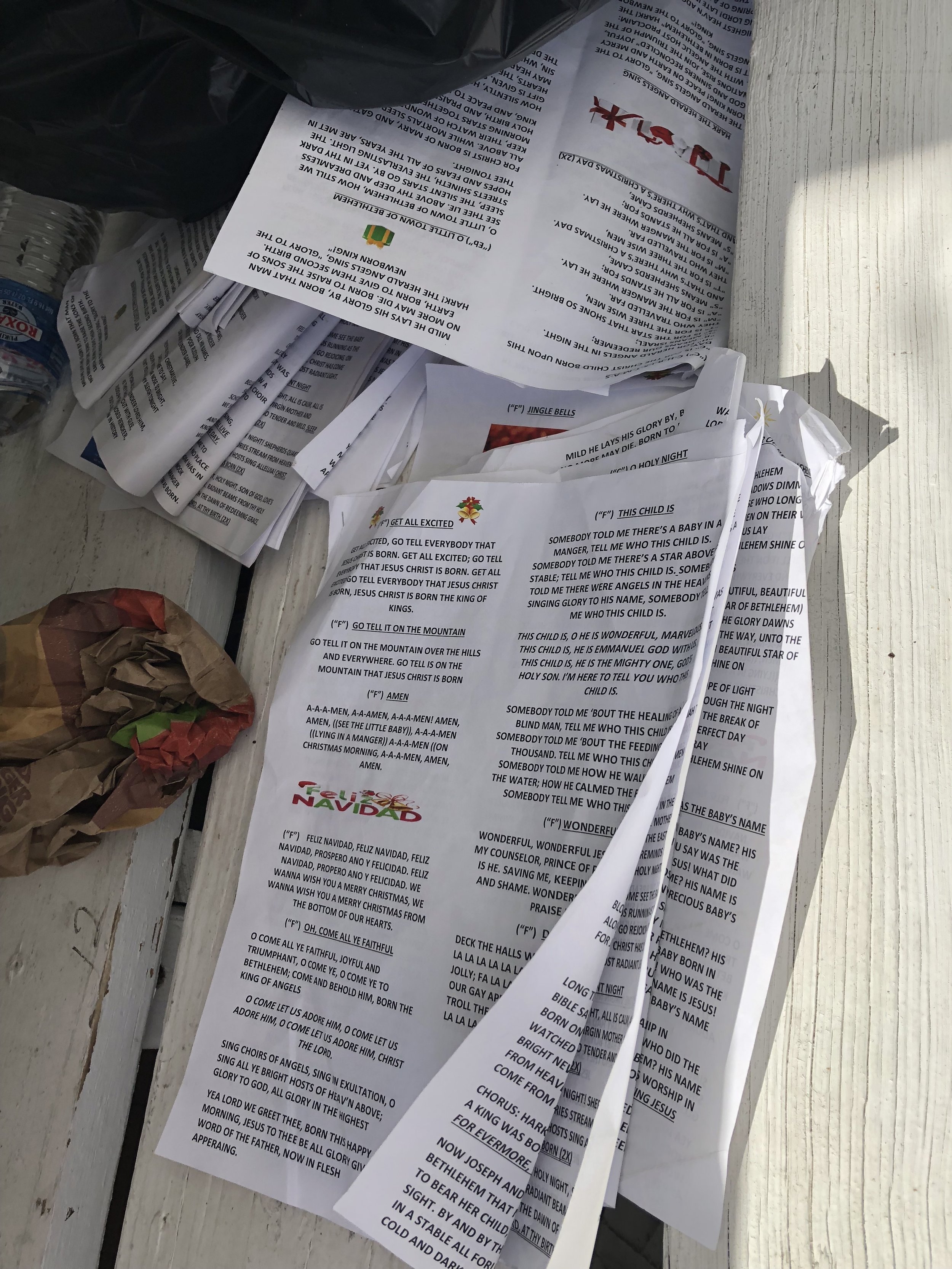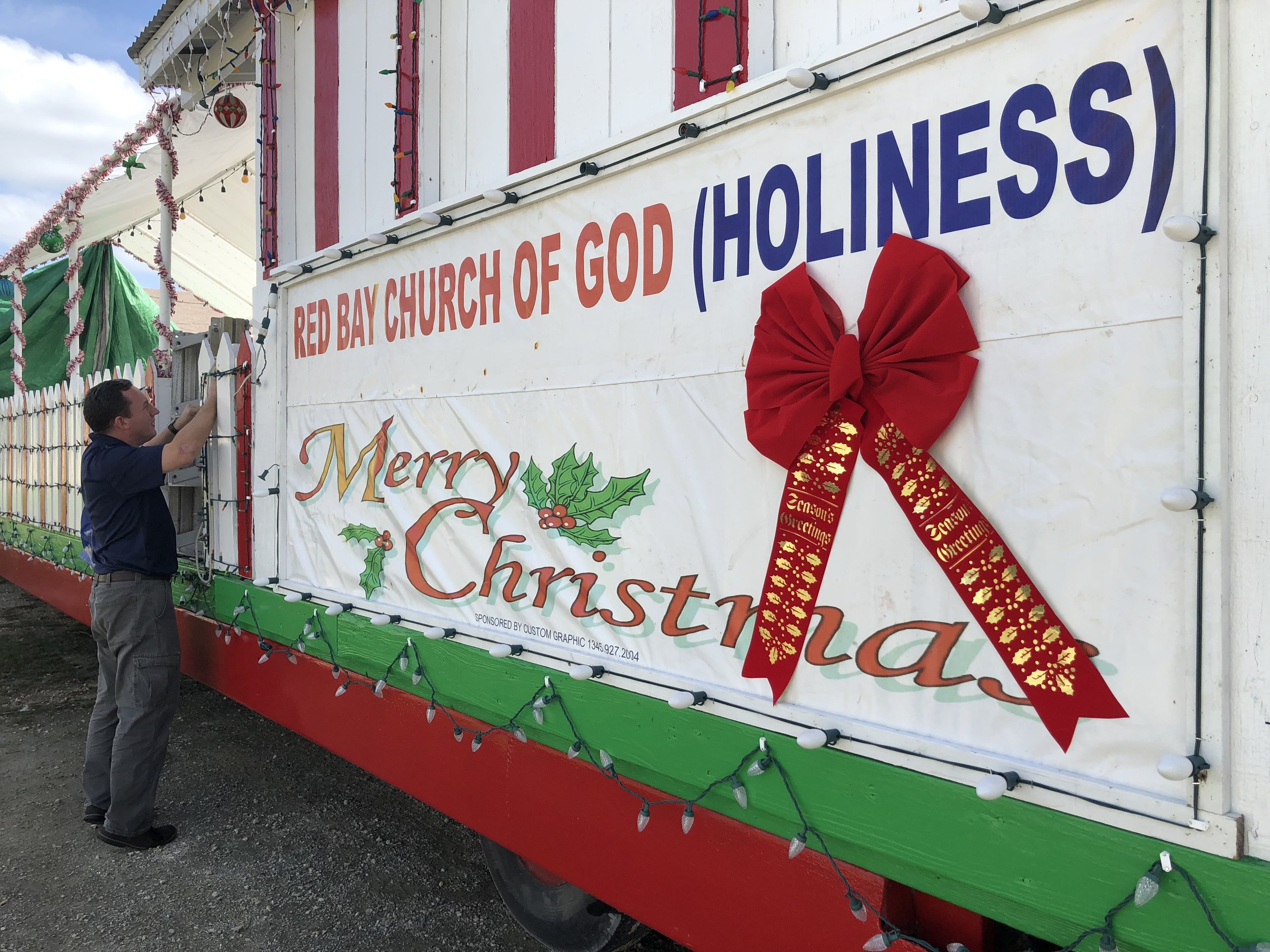Christmas in the Caymans: Carolers take songs by the semi-truck load to the beach goers and tax dodgers
GRAND CAYMAN ISLAND – The sound of whistling wind and Caribbean Sea waves splashing into the beach faded to background noise as notes from keyboards and human voices rose louder from Queens Highway.
On the road running parallel to the sea (and the dozens of beach hotels, AirBnB condos and private homes), police cars escorted a semi-truck pulling a flatbed trailer that exploded with Christmas cheer. A makeshift white picket fence around the trailer and a makeshift roof on top of the trailer were covered in Christmas lights and red, green and white glitter. These guard rails held in roughly 40 people, who sat on white benches in the trailer, singing in harmony and with as much gusto as their lungs allowed.
Joy to the world, the Lord has come
Let earth receive her King
Let every heart prepare Him room
I’d read an article in the Cayman Compass newspaper earlier in the day about the Red Bay Church of God Holiness (a Wesleyan tradition protestant church) congregation that has been operating the island-wide caroling truck for 32 years. It said the carolers would be rolling around the island this past Friday and Saturday evening from 6 p.m. to 12:30 a.m.
“The Christmas trailer was the brainchild of retired Pastor Bob Thompson, and started in 1986 as a means of spreading the Christmas and Christian message,” the article in the Compass said.
The caroling trailer of the Red Bay Church of God (Holiness) in Grand Cayman Island parked in the church yard.
I felt fortunate the Red Bay carolers were passing my hotel. It was 11:30 p.m. and my daughters were already sleeping. My wife and I watched in wonder at the window. Then I rushed out of my vacation rental at the Wyndam Reef Resort and onto the third-floor balcony, raising my iPhone to record the spectacle.
Other sun-kissed vacationers stood on the balcony recording as well. One middle-aged woman from Boston greeted me with a huge smile as I arrived in the filming line-up:
“I LOVE this,” she said. “I’m Jewish. And I still love this. My family and I have been coming to this resort for 20 years during the holidays and we look forward to this group singing carols. It’s so special.”
With that, the choir sprang into action again, while the flatbed made an awkward turn at the grocery and liquor store across the street from my hotel.
And heaven and nature sing, and heaven and nature sing
And heaven and heaven and nature sing.
The neighbor woman speculated at the change in the caroling group this year. I recounted to her what I had read in the newspaper about the church and caroling group.
“You know what. This may be different,” she said. “It’s usually a flatbed truck.”
“Maybe they spruced it up this year?”
“Or it’s a different church?” she said. “I don’t know. But I love it. We have been coming here for 20 years. It’s like nothing else.”
The choir passed back by our hotel, heading south and west. They waved back to us while closing out “Joy to the World.”
He rules the world with truth and grace
And makes the nations prove
The glories of His righteousness
And wonders of His love, and wonders of His love
And wonders, wonders of His love
As I stood there watching the carolers, I thought about Cayman Islands in perception and in practice. Before visiting, I perceived Grand Cayman to be an upscale playground for the wealthy, tax evaders and offshore incorporations. The Caymans don’t have a corporate tax, making it an alluring place for multinational corporations to base subsidiary companies, a move that helps the companies avoid some taxes. As a result, a cottage industry of law firms and finance firms set up shop in Cayman Islands to serve the 65,000 companies that have registered in the Cayman Islands as of 2017. The Caymans makes money by these companies paying an annual license fee rather than taxes.
Despite its reputation for good snorkeling and nice family hotels, I was reluctant to vacation in a place with a reputation for ethically questionable business hospitality. Should we punish other tax havens such as Switzerland, the British Virgin Islands and Bermuda by keeping our tourist dollars away from places that welcome the likes of tax-dodging hedge fund managers?
We booked for Cayman anyways because while booking last minute we couldn’t find another island with warm weather and room at the inn! Cayman was our resort destination of last resort.
What we found on the ground was different than my perception. I didn’t see skyscrapers with questionable finance firms (many of those offices are located in low-rise, second-floor offices in the Camana Bay section of Grand Cayman by the way) or fat cat, exiled bankers driving Lamborghinis, sipping Pina Coladas and smoking cigars on the beach (they probably look more normal and blend in better). Rather, we met a lot of middle-class vacationers from across the U.S. We met locals who seemed kind, polite and family oriented. And we saw a country that was, frankly, more religious than the United States.
Roughly 81.6 percent of the 60,000 residents of the Cayman Islands identify as Christian compared to 67.3 percent in the rest of the Caribbean according to the Association of Religion Data Archives in 2015. Roughly half are protestant and only 15 percent of the people are not religious at all. And driving around the country on the left side of the road (it’s a British Overseas Territory), one sees Christian churches – Episcopalian, Catholic, Baptist etc. – dotting the beachscape.
We also found roads, an airport and hotels that were clean, well-cared for and without the dramatic crime one sometimes finds in other Caribbean and central American nations. The CIA World Factbook notes that Caymanians enjoy a standard of living similar to Switzerland.
Christopher Columbus is said to have discovered the Cayman Islands on May 10, 1503, when strong winds caused his ships to drift off course. He named the two smaller Cayman Islands – now called Cayman Brac and Little Cayman -- “Las Tortugas” that translates from Spanish as “the turtles.”
Over time, the largely uninhabited islands drew an eclectic group of people ranging from pirates, shipwrecked sailors and deserters from Oliver Cromwell’s army in Jamaica in the 1600s. It remained a sleepy outpost between Cuba and Central America until the Federation of West Indies dissolved in 1962 and the Caymans remained connected to Great Britain but began to grow its population and economy.
The people are 20 percent black, 20 percent white and 40 percent mixed, with the remaining 20 percent of various ethnic groups according to the CIA World Factbook. And religion plays a major role in public life. The Red Bay Carolers are not so unusual for Cayman.
Hear the bells ring.
Hear the angels sing,
“Glory! Hallelujah to the newborn King!”
Peace on earth, good will to men;
Jesus is born in Bethlehem.
On my last day on the island, I called up the pastor of Red Bay Church of God (Holiness), David Woods, and asked if I could stop by on my way to the airport to hear about the church, its annual caroling project and his views of the island.
Pastor David Woods inside the Red Bay Church of God (Holiness), which plans the annual caroling road show around Grand Cayman Island.
My family and I pulled up to the church on 38 Lord’s Way off of Selkirk Drive and found a sprawling complex of buildings next to a large church structure. In the courtyard was parked the carolers flat bed and big rig truck. I met Elroy Stewartson, who heads up the Red Bay Gospel Band and the caroling project and was fastening loose ladders and other equipment on the caroling mobile. He could barely speak because his voice was so raspy from singing Christmas carols for six hours the night before.
I turned and met Pastor Woods, a Midwest guy who has degrees from Indiana Wesleyan University and Kansas Christian College. He showed us the church building and we spoke in his office for 20 minutes for our Religion Unplugged podcast and for this article. He’s only lived in Grand Cayman since April but said he has learned the annual caroling wagon is a highlight of his church’s year.
“The people have done this so many years now, they kind of know what they are doing,” he said. “They look forward to this every year.”
Woods said the Christian roots of the Cayman Islands are found in the nation’s coat of arms and motto, which quotes Psalms 24:2 “He hath founded it upon the seas.” Many businesses are closed on Sunday in the Cayman Islands, honoring the Christian day of worship.
The Freedom House has given Cayman Islands its top score for most free in both political rights and civil liberties. But some tension is emerging between the Cayman Islands and Great Britain on LGBTQ issues.
Cayman law defines marriage as between “one man and one woman.” A same-sex couple – a Caymanian lawyer named Chantelle Day and her partner, Vickie Bodden Bush, a nurse from the UK – have challenged the law in courts and seek to marry. Their lawyers argue that Cayman’s marriage law “is incompatible with various rights guaranteed under the islands’ Constitution.”
And outgoing British governor Helen Kilpatrick made LGBT issues part of her farewell address last February as she ended her 4-year post in the islands. “I would urge the government to make progress on this legislation to advance the rights of LGBT members” she said according to Cayman News Service.
Meanwhile, some legislators in the Caymans have said as recently as 2015 that expanding rights for the LBGT community will lead toward normalizing bestiality and damaging traditional marriage. Lawmaker Anthony Eden called homosexuality “evil” and “deviant behavior.”
Pastor Woods acknowledges the tension in that debate. He points to materialism as perhaps a more important issue for Christians on the island to confront. “Like in the U.S., the Cayman Islands is considered a Christian nation. But that is more in name than in reality,” he said. He noted his church members face a challenge to live true Christianity on an island with “lots of consumerism and materialism.”
Woods notes that traffic is often thick during rush hour on the island. People are working hard. Many are too busy to attend church. Many locals are too busy to even enjoy the island life. “While it is an island nation, it’s been affected by the U.S. and others,” Woods said. “Still, a lot of people need the gospel.”
So the Red Bay Church of God (Holiness) made its annual journey around the island this past Friday and Saturday evening before Christmas, singing about the birth of Christ to locals and vacationers; to the secular and the religious; and to taxpayers and tax dodgers.
After all, Mary and Joseph stayed in the barn affiliated with a hotel in Bethlehem 2,000 years ago because of a tax decree from Caesar Augustus. Here is the King James Version of Luke 2:1-7:
And it came to pass in those days, that there went out a decree from Caesar Augustus, that all the world should be taxed. 2(And this taxing was first made when Cyrenius was governor of Syria.) 3And all went to be taxed, every one into his own city. 4And Joseph also went up from Galilee, out of the city of Nazareth, into Judaea, unto the city of David, which is called Bethlehem; (because he was of the house and lineage of David:) 5To be taxed with Mary his espoused wife, being great with child. 6And so it was, that, while they were there, the days were accomplished that she should be delivered. 7And she brought forth her firstborn son, and wrapped him in swaddling clothes, and laid him in a manger; because there was no room for them in the inn.
As the caroling trailer rolled off away from my hotel and past a craggy mangrove preserves, the choir sang a chorus to Born in Bethlehem:
Hear the bells ring
Hear the angels sing, Glory Hallelujah to the newborn King
Peace on earth, good will to men
Jesus is born in a Bethlehem.


